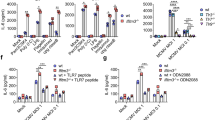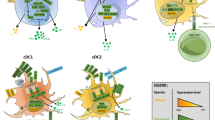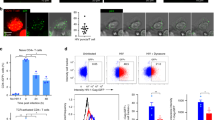Abstract
Robust type-I interferon (IFN-α/β) induction in plasmacytoid dendritic cells, through the activation of Toll-like receptor 9 (TLR9), constitutes a critical aspect of immunity1,2,3,4,5,6. It is absolutely dependent on the transcription factor IRF-7, which interacts with and is activated by the adaptor MyD88. How plasmacytoid dendritic cells, but not other cell types (such as conventional dendritic cells), are able to activate the MyD88–IRF-7-dependent IFN induction pathway remains unknown. Here we show that the spatiotemporal regulation of MyD88–IRF-7 signalling is critical for a high-level IFN induction in response to TLR9 activation. The IFN-inducing TLR9 ligand, A/D-type CpG oligodeoxynucleotide (CpG-A)3,4,8,9,10,11, is retained for long periods in the endosomal vesicles of plasmacytoid dendritic cells, together with the MyD88–IRF-7 complex. However, in conventional dendritic cells, CpG-A is rapidly transferred to lysosomal vesicles. We further show that conventional dendritic cells can also mount a robust IFN induction if CpG-A is manipulated for endosomal retention using a cationic lipid. This strategy also allows us to demonstrate endosomal activation of the IFN pathway by the otherwise inactive TLR9 ligand B/K-type oligodeoxynucleotide (CpG-B)3,4,8,9,10,11,12. Thus, our study offers insights into the regulation of TLR9 signalling in space, potentially suggesting a new avenue for therapeutic intervention.
This is a preview of subscription content, access via your institution
Access options
Subscribe to this journal
Receive 51 print issues and online access
$199.00 per year
only $3.90 per issue
Buy this article
- Purchase on SpringerLink
- Instant access to full article PDF
Prices may be subject to local taxes which are calculated during checkout




Similar content being viewed by others
References
Colonna, M., Trinchieri, G. & Liu, Y. J. Plasmacytoid dendritic cells in immunity. Nature Immunol. 5, 1219–1226 (2004)
Wagner, H. The immunobiology of the TLR9 subfamily. Trends Immunol. 25, 381–386 (2004)
Klinman, D. M. Immunotherapeutic uses of CpG oligodeoxynucleotides. Nature Rev. Immunol. 4, 249–258 (2004)
Krieg, A. M. CpG motifs in bacterial DNA and their immune effects. Annu. Rev. Immunol. 20, 709–760 (2002)
Theofilopoulos, A. N., Baccala, R., Beutler, B. & Kono, D. H. Type I interferons (α/β) in immunity and autoimmunity. Annu. Rev. Immunol. 23, 307–335 (2005)
Ronnblom, L. & Alm, G. V. Systemic lupus erythematosus and the type I interferon system. Arthritis Res. Ther. 5, 68–75 (2003)
Honda, K. et al. IRF-7 is the master regulator of type-I interferon-dependent immune responses. Nature advance online publication, 30 March 2005 (doi:10.1038/nature03464)
Verthelyi, D., Ishii, K. J., Gursel, M., Takeshita, F. & Klinman, D. M. Human peripheral blood cells differentially recognize and respond to two distinct CpG motifs. J. Immunol. 166, 2372–2377 (2001)
Krug, A. et al. Identification of CpG oligonucleotide sequences with high induction of IFN-α/β in plasmacytoid dendritic cells. Eur. J. Immunol. 31, 2154–2163 (2001)
Hemmi, H., Kaisho, T., Takeda, K. & Akira, S. The roles of Toll-like receptor 9, MyD88, and DNA-dependent protein kinase catalytic subunit in the effects of two distinct CpG DNAs on dendritic cell subsets. J. Immunol. 170, 3059–3064 (2003)
Kerkmann, M. et al. Activation with CpG-A and CpG-B oligonucleotides reveals two distinct regulatory pathways of type I IFN synthesis in human plasmacytoid dendritic cells. J. Immunol. 170, 4465–4474 (2003)
Krieg, A. M. et al. CpG motifs in bacterial DNA trigger direct B-cell activation. Nature 374, 546–549 (1995)
Izaguirre, A. et al. Comparative analysis of IRF and IFN-α expression in human plasmacytoid and monocyte-derived dendritic cells. J. Leukoc. Biol. 74, 1125–1138 (2003)
Coccia, E. M. et al. Viral infection and Toll-like receptor agonists induce a differential expression of type I and λ interferons in human plasmacytoid and monocyte-derived dendritic cells. Eur. J. Immunol. 34, 796–805 (2004)
Latz, E. et al. TLR9 signals after translocating from the ER to CpG DNA in the lysosome. Nature Immunol. 5, 190–198 (2004)
Honda, K. et al. Role of a transductional-transcriptional processor complex involving MyD88 and IRF-7 in Toll-like receptor signaling. Proc. Natl Acad. Sci. USA 101, 15416–15421 (2004)
Takaoka, A. et al. Integral role of IRF-5 in the gene induction programme activated by Toll-like receptors. Nature 434, 243–249 (2005)
Zabner, J., Fasbender, A. J., Moninger, T., Poellinger, K. A. & Welsh, M. J. Cellular and molecular barriers to gene transfer by a cationic lipid. J. Biol. Chem. 270, 18997–19007 (1995)
Heil, F. et al. Species-specific recognition of single-stranded RNA via toll-like receptor 7 and 8. Science 303, 1526–1529 (2004)
Diebold, S. S., Kaisho, T., Hemmi, H., Akira, S. & Reis e Sousa, C. Innate antiviral responses by means of TLR7-mediated recognition of single-stranded RNA. Science 303, 1529–1531 (2004)
Heil, F. et al. The Toll-like receptor 7 (TLR7)-specific stimulus loxoribine uncovers a strong relationship within the TLR7, 8 and 9 subfamily. Eur. J. Immunol. 33, 2987–2997 (2003)
Hacker, H. et al. CpG-DNA-specific activation of antigen-presenting cells requires stress kinase activity and is preceded by non-specific endocytosis and endosomal maturation. EMBO J. 17, 6230–6240 (1998)
Hacker, H. et al. Immune cell activation by bacterial CpG-DNA through myeloid differentiation marker 88 and tumor necrosis factor receptor-associated factor (TRAF)6. J. Exp. Med. 192, 595–600 (2000)
Radler, J. O., Koltover, I., Salditt, T. & Safinya, C. R. Structure of DNA-cationic liposome complexes: DNA intercalation in multilamellar membranes in distinct interhelical packing regimes. Science 275, 810–814 (1997)
Koltover, I., Salditt, T., Radler, J. O. & Safinya, C. R. An inverted hexagonal phase of cationic liposome–DNA complexes related to DNA release and delivery. Science 281, 78–81 (1998)
Durrer, P., Gaudin, Y., Ruigrok, R. W., Graf, R. & Brunner, J. Photolabeling identifies a putative fusion domain in the envelope glycoprotein of rabies and vesicular stomatitis viruses. J. Biol. Chem. 270, 17575–17581 (1995)
Brunetti, C. R., Dingwell, K. S., Wale, C., Graham, F. L. & Johnson, D. C. Herpes simplex virus gD and virions accumulate in endosomes by mannose 6-phosphate-dependent and -independent mechanisms. J. Virol. 72, 3330–3339 (1998)
Leadbetter, E. A. et al. Chromatin–IgG complexes activate B cells by dual engagement of IgM and Toll-like receptors. Nature 416, 603–607 (2002)
Mellman, I. Endocytosis and molecular sorting. Annu. Rev. Cell Dev. Biol. 12, 575–625 (1996)
Asselin-Paturel, C., Brizard, G., Pin, J. J., Briere, F. & Trinchieri, G. Mouse strain differences in plasmacytoid dendritic cell frequency and function revealed by a novel monoclonal antibody. J. Immunol. 171, 6466–6477 (2003)
Acknowledgements
We thank J. Vilcek, H. Rosen, H. Ohno, F. Nakatsu, A. Nakano, M. Lamphier, L. Cantley and T. Curran for advice, S. Akira for TLR9 and MyD88 mutant mice, G. Trinchieri for the pDC-specific antibody, A. Miyawaki for Venus (a variant of YFP), H. Miyoshi for lentivirus vectors, and M. Shishido for technical assistance. This work was supported in part by a grant for Advanced Research on Cancer and a Grant-In-Aid for Scientific Research on Propriety Areas from the Ministry of Education, Culture, Sports, Science and Technology of Japan, the Uehara Memorial Foundation, the Sumitomo Foundation, the Senri Life Science Foundation and the Nakajima Foundation. H.N. was supported by an Ishidu Shun Memorial Scholarship.
Author information
Authors and Affiliations
Corresponding author
Ethics declarations
Competing interests
The authors declare that they have no competing financial interests.
Supplementary information
Supplementary Figure S1
This file contains Supplementary Figure S1 a, b, c and d. (PDF 655 kb)
Supplementary Figure S2
This file contains Supplementary Figure S2 a, b, c, d and e. (PDF 1107 kb)
Supplementary Figure S3
This file contains Supplementary Figure S3 a, b, c, d and e. (PDF 612 kb)
Supplementary Figure S4
This file contains Supplementary Figure S4 a, b, c, d and e. (PDF 699 kb)
Supplementary Figure S5
This file contains Supplementary Figure S5 a, b, c, d, e, f and g. Modelling and simulation of CpG-dependent IFN induction. (PDF 95 kb)
Supplementary Video S1
Time-lapse analysis of CpG-A trafficking in bone-marrow-derived conventional dendritic cells. (MOV 1176 kb)
Supplementary Video S2
Time-lapse analysis of CpG-B trafficking in bone-marrow-derived conventional dendritic cells. (MOV 1188 kb)
Supplementary Video S3
Time-lapse analysis of CpG-A/DOTAP trafficking in bone-marrow-derived conventional dendritic cells. (MOV 3638 kb)
Supplementary Notes
This file contains the Supplementary Methods, Legends to accompany Supplementary Figures S1-S5, Supplementary Video Legends, Supplementary Discussion and additional References. (DOC 88 kb)
Rights and permissions
About this article
Cite this article
Honda, K., Ohba, Y., Yanai, H. et al. Spatiotemporal regulation of MyD88–IRF-7 signalling for robust type-I interferon induction. Nature 434, 1035–1040 (2005). https://doi.org/10.1038/nature03547
Received:
Accepted:
Published:
Issue Date:
DOI: https://doi.org/10.1038/nature03547
This article is cited by
-
Human plasmacytoid dendritic cells express the functional purinergic halo (CD39/CD73)
Purinergic Signalling (2024)
-
Investigating the TLR4/TAK1/IRF7 axis in NLRP3-Mediated Pyroptosis in Parkinson's Disease
Inflammation (2024)
-
Astrocytes evoke a robust IRF7-independent type I interferon response upon neurotropic viral infection
Journal of Neuroinflammation (2023)
-
Signaling pathways involved in the biological functions of dendritic cells and their implications for disease treatment
Molecular Biomedicine (2023)
-
Regulation of the nucleic acid-sensing Toll-like receptors
Nature Reviews Immunology (2022)



